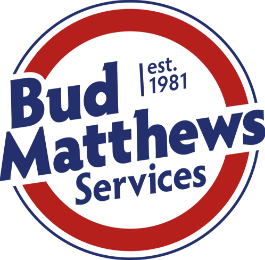Updated May 2022
The air you breathe directly impacts your wellbeing. This is why indoor air quality is crucial to the health of your home or business, especially for those who deal with allergies, asthma, or any other preexisting breathing issues. The number of airborne pollutants in homes and businesses are on the rise each and every year, with new heat-generating appliances and cleaning supplies being introduced into enclosed spaces over time. Fortunately, there are a few easy ways you can combat the rise of pollutants in your home on your own. If you’re looking for a way to get great indoor air quality, Bud Matthews Services of Chapel Hill has your back with a few key tips.
Change the Air Filter
Arguably the easiest and most important method of fighting back against airborne pollutants within your North Carolina home or commercial building is remembering to change your air filter regularly. When your home or business’s air conditioner is on, it pulls air in through one or more intake vents, which is then cooled and sent to other parts of your home. Air passes through a filter during this process, and the filter captures hair, dust, dirt, and other pollutants, preventing them from entering the HVAC system and your vents. By regularly changing your air filter, you’re helping this part of the system do its job correctly, leading to cleaner air, lower energy costs, a longer HVAC system lifespan, and more.
Keep Your Floors Clean
The best way to keep improve indoor air quality in your Chapel Hill home (or surrounding area) home is to eliminate pollutants at the source. For most homes, that means keeping floors clean. Because your floor is the part of your home you most often come into contact with during the day, they tend to hold more pollutants than other areas.
Practice taking off your shoes before entering your home to prevent tracking pollutants indoors. If you have hardwood floors, make it a habit to regularly sweep, particularly in high-traffic areas such as entryways, living areas, and kitchens. If you have rugs or carpets, be vigilant about thoroughly vacuuming these spaces. Dust, hair, and other debris can easily become tangled in the fibers of carpets and rugs, then float up into the air to negatively impact indoor air quality when disturbed.
Use Exhaust Fans
Sometimes, the act of opening a window can let in as much pollution as it lets out, including pollen and fumes from vehicles. Fortunately, there is still an easy way to pull pollutants from your home or commercial building outside without ever cracking a window: exhaust fans.
Exhaust fans work to pull pollutants, hot air, and more out of your home in a simple, unobtrusive way that can be extremely helpful for those looking to improve indoor air quality. The fans work to pull air out of bathrooms and other spaces and push it outdoors or into areas such as your attic, where the removed pollutants will no longer affect your building’s air supply. However, you’ll need to make sure you’re getting the most out of this method by regularly cleaning your exhaust fans. Otherwise, they may spread pollutants rather than remove them.
Add Houseplants to Your Home
Adding plants to your home decor is a great way to naturally purify the air inside and keep indoor air quality high. Plants “breathe” in various pollutants throughout your home and produce clean, fresh oxygen. Place several in your living space, bedrooms, dining spaces, or even bathrooms to ensure every corner of your home receives the air recycling power that houseplants have to offer.
Maintain Dust Magnets
Some surfaces and areas throughout your home tend to accumulate more dust than others, and if you’re dedicated to fighting indoor air pollution, it’s imperative to keep these areas clean. Some of the most common dust magnets in a home include:
- Ceiling fans and light fixtures
- Lampshades
- Carpets and rugs
- Books and bookshelves
- Curtains
- Blinds
- Electronics
- Throw pillows and stuffed animals
All of these items capture and hold onto dust and other pollutants throughout your home. Make it a habit to regularly dust and clean these items to promote optimal air quality within your home.
Get More Tips from the Pros
If you’re a resident of Apex, Durham, Research Triangle Park (RTP), or other nearby North Carolina communities and are looking for ways to enhance your home or business’s indoor air quality, you’re in luck! Bud Matthews Services offers access to clean air all year-round by offering tips on preventing indoor air pollution as well as providing services to remove and control indoor pollution.
To learn more about our indoor air quality services or to schedule a visit from a licensed, experienced HVAC professional, contact us. Our highly knowledgeable staff are here to answer any questions you may have and can get you on the path to cleaner, better air today.

